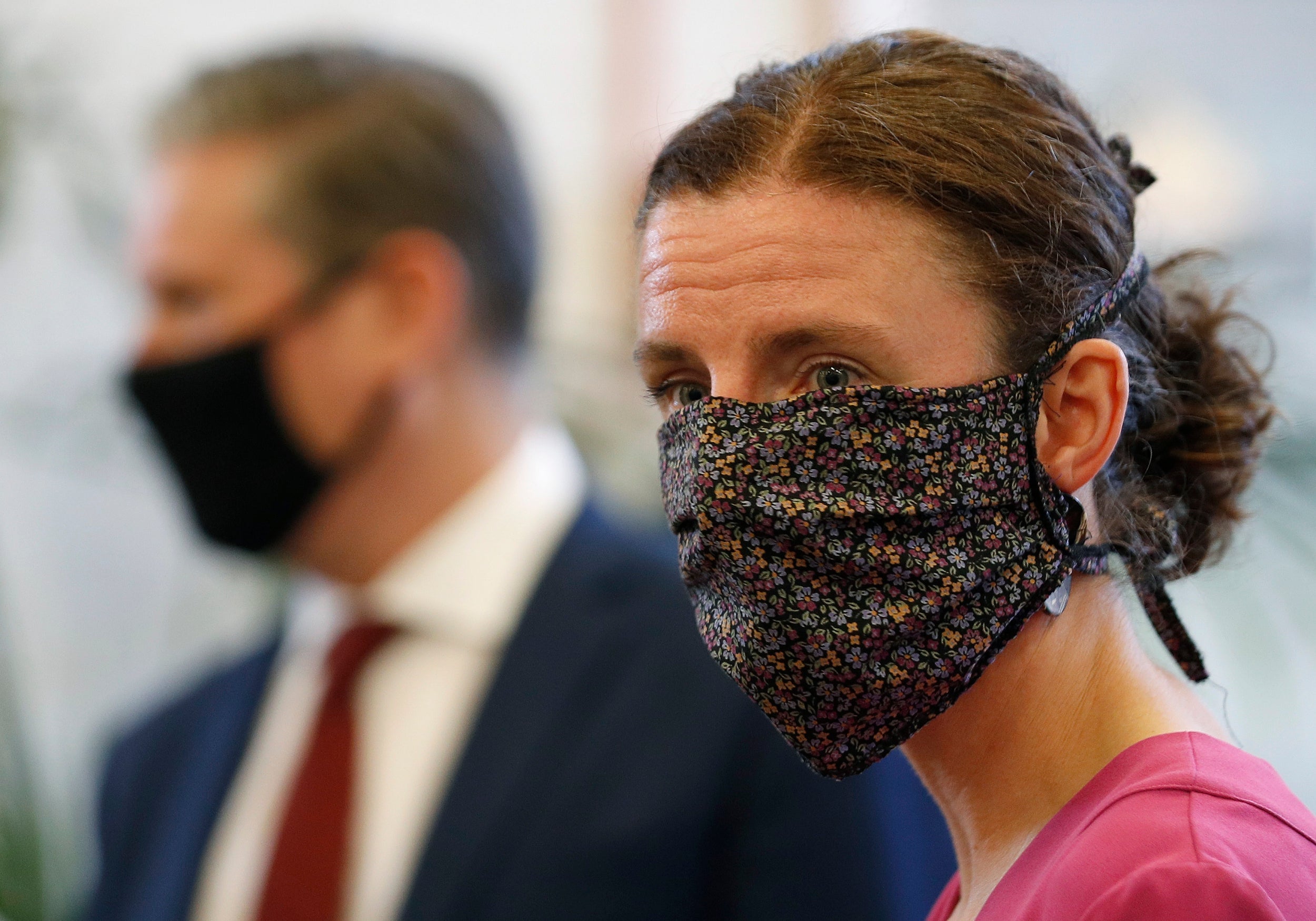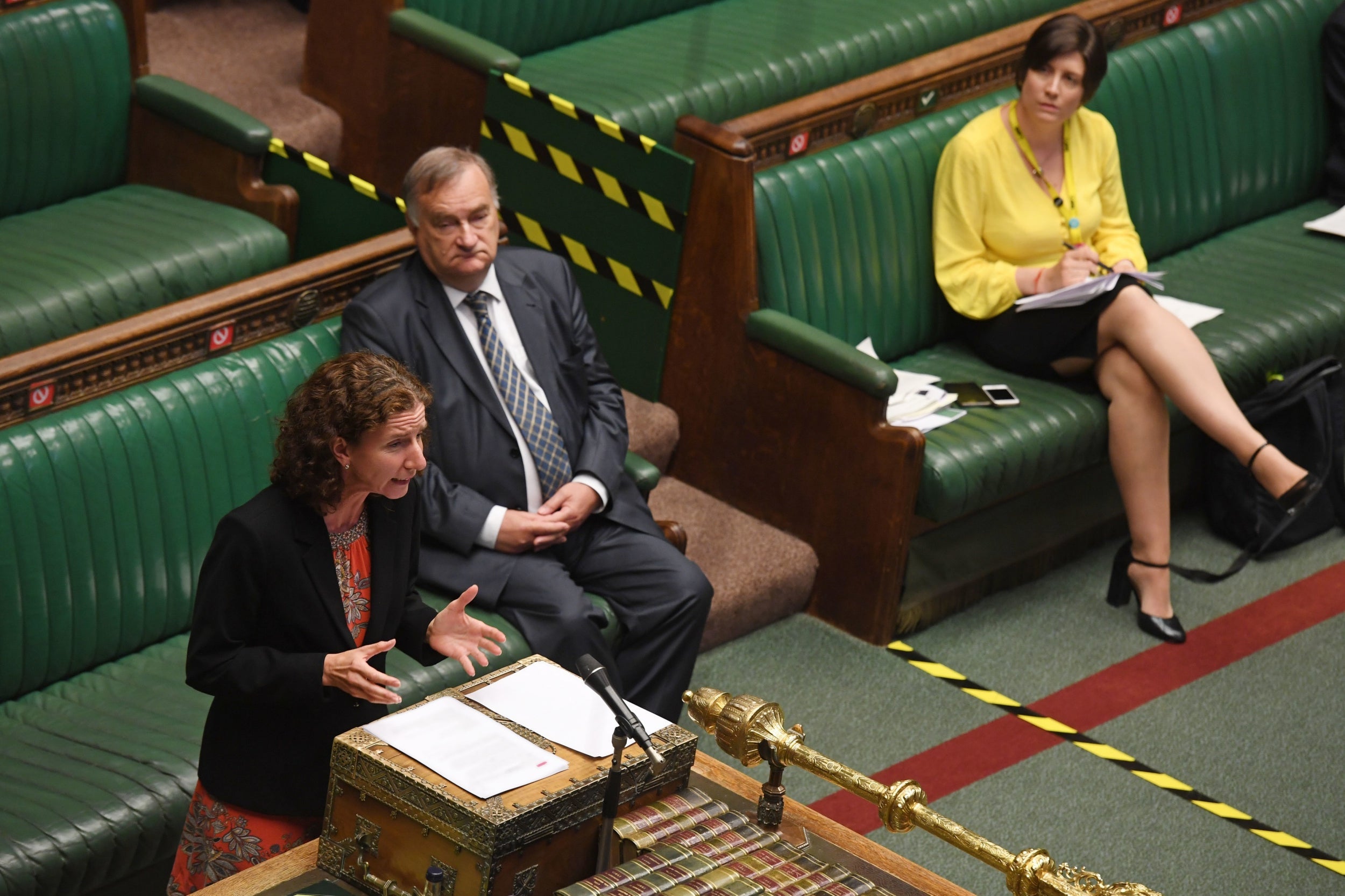Financial support for jobs and businesses hit by coronavirus must continue until confidence and growth are back, even if it means putting off for years measures to rein in the UK’s ballooning state debt, Labour’s shadow chancellor has said.
Speaking to The Independent as chancellor Rishi Sunak began scaling back his job retention scheme, Anneliese Dodds said that so long as interest rates remain low, the government’s “number one goal” must be to preserve economic capacity, rather than risking growth with fiscal tightening measures to reduce a debt mountain already topping annual GDP at almost £2 trillion.
Labour has launched a ferocious attack on Mr Sunak’s blanket phase-out of furlough, calling on him to keep the scheme going longer for sectors hit hardest by social distancing, like hospitality and the arts. The 80 per cent wage subsidy has already cost £32bn, but is being gradually withdrawn between now and November, with employers required to start paying national insurance and pension contributions from this week, at an estimated monthly cost of £70 per employee.
As Boris Johnson reversed lockdown relaxation plans to force bowling alleys, casinos and wedding reception venues to stay shut for longer, Ms Dodds made clear she sees the chancellor’s “one size fits all” approach as a “historic mistake” which will cost huge numbers of jobs in areas where employers are banned from returning to normal operations.
While accepting that Mr Sunak’s extraordinary financial package for jobs and the self-employed cannot continue indefinitely in its current form, she made clear it may be years before the economy is sufficiently robust to be fully weaned off state support.

She pointed to employment support schemes in France, where payments are already envisaged to run two years into the future, and the German “Kurzarbeit” – short-time working – programme, which has been in place since the 2008 financial crash to offset losses in wages in sectors like the automotive industry when hours are cut.
And she warned against any attempt to rerun the austerity policies of 2010, when savage cuts to spending and hikes in tax to pay down the deficit led to a decade of stagnant wages and sluggish growth and, she argued, left Britain woefully unprepared to resist the ravages of Covid-19.
Ms Dodds has already warned the chancellor against rises in general taxes like VAT, income tax or national insurance in the autumn Budget, arguing that they would kill off consumer confidence at a time when business health remains fragile and that any additional burden must be borne by those with “the broadest shoulders”.
But while saying she would be “surprised if Labour didn’t end up arguing for a more progressive tax system at the time of the next general election”, she shied away from earlier suggestions that she would back a wealth tax on the assets of the richest, insisting policy decisions will not be taken until nearer the 2024 poll.
“Currently, the real challenge is for government to be focused on delivering that growth, because unless we do that, unless we preserve that economic capacity, how we then tax it is a second-order question,” she said. “We’ve got to get the economic capacity back up there in the first place.”
Asked how long she was ready to see debt keep climbing to deal with the impact of the disease, Ms Dodds replied: “We are currently operating in a low interest rate environment. That may well not last forever, and we certainly shouldn’t assume that it will.
“But for as long as we are in that low interest rate environment, government really has got to focus on getting demand back up again, getting growth going again, preserving that economic capacity. That’s got to be the number one goal for government right now.”

Fiscal tightening measures like tax hikes on low and middle-income households or public spending cuts will be “damaging” if they are brought forward too soon, at a time when the UK should be trying to get back to a more normal pattern of economic growth, she said.
“Whatever fiscal measures are taken in the future are going to be compromised by whether we’ve seen that uptick in growth driven by resumption of demand, so I think that is what government really needs to be focused on.”
Asked if that might mean Covid-19 financial support packages being kept going through the years leading up to the 2024 election, Ms Dodds declined to put an end date on state interventions.
“The framework currently for government seems to be very much quite a short-term one,” she said. “You’ve got other countries looking at this in a much longer perspective – Germany and France for example taking a much longer perspective with regards to supporting wages.”
And she said: “The problem is we are at a point where it’s very difficult for anyone to foresee what the long-term impact of this crisis is going to be on consumption patterns.
“Now, if we end up three or four years down the line still having to have this degree of social distancing, clearly that would have a very clear structural impact on consumption.
“We need to do all that we can to try and ensure that we’re not seeing a depression of consumption that’s becoming more structural – and above all that we’re trying to maintain demand as much as possible.”
Ms Dodds said that cash from Mr Sunak’s £9bn job retention bonus, which offers £1,000 for each furloughed employee retained until January, could be reallocated as the chancellor’s current plans would save relatively few jobs while running up massive “deadweight” costs in cash for workers who were not under any threat of redundancy.
But pressed on how the chancellor should otherwise fund support schemes, she made clear her preference for continued borrowing, rather than tax hikes or spending cuts.
“We know what happened after 2010,” said Ms Dodds. “We know that spending cuts at that stage reduced a lot of people’s confidence. We had a slow recovery compared to many other countries. We really don’t want to be in a similar position again after this crisis.”
With vacancies few and far between and reports of hundreds of people applying for bar work and receptionists’ jobs, redundancies caused by the furlough rollback risk resulting in long-term unemployment, with lasting costs for the economy, she warned.
“We know already from research that somebody who’s been unemployed when they’re young is likely to be earning, even 20 years down the line, a fifth less than somebody who hasn’t experienced a period of unemployment,” said Ms Dodds. “If you can avoid that, there are savings in terms of social security but also the impact on their life-long earnings and the overall tax take for those individuals.
“I’ve asked the chancellor to provide publicly the evidence that he’s commissioned around the impact of unemployment of this one-size-fits-all approach to withdrawing support. He’s not been willing to do that, he hasn’t published that evidence.”
Covid-19 has been “a virus which thrives on inequalities”, with overcrowded housing and precarious finances fuelling its spread by making social distancing more difficult, she said, pointing to evidence that a quarter of families went into the crisis with less than £100 in savings.
But it has also had the effect of making people “question their assumptions” about priorities for the future direction of society, by highlighting the contribution of key workers including not only health and care staff but also low-paid private sector delivery drivers and by increasing awareness of the importance of well-resourced public services and community assets like high streets and parks, said Ms Dodds.

“I hope that awareness will lead to much more being done to deal with these issues, and above all to us never entering again another crisis with such a lack of resilience, whether it be in our public services or in our household finances,” she said.
After four months as shadow chancellor – and just three years as an MP – Ms Dodds played down the significance of her history-making position as first female holder of the office.
“I’m quite surprised that that is the first time, if I’m honest,” she said. “But to me, the critical thing is whether you have politicians in senior roles who are able to empathise and understand where different groups of people are coming from and what their concerns are.”
And the Oxford PPE graduate and former lecturer also shrugged off her lack of a background in the City, in comparison with hedge fund partner and Goldman Sachs alumnus Mr Sunak.
“People bring a variety of different kinds of experience to the table,” she said. “My father was an accountant, he was a small businessman. Worked six days a week for 30 years or so.
“He was a big influence on me in my view of how critical business is to different communities and the very positive impact that it can have, as well as my sense of injustice when businesses don’t do the right thing
“Also, I chaired the welfare advice centre on the council estate where I lived, which certainly gave me quite an insight into some of the downstream impacts of those major financial institutions on individuals, negative as well as positive.”
tinyurlis.gdclck.ruulvis.netshrtco.de
مقالات مشابه
- شرکت صادرات و واردات کالاهای مختلف از جمله کاشی و سرامیک و ارائه دهنده خدمات ترانزیت و بارگیری دریایی و ریلی و ترخیص کالا برای کشورهای مختلف از جمله روسیه و کشورهای حوزه cis و سایر نقاط جهان - بازرگانی علی قانعی
- خبر گزاری ها و سایت موزیک ومهره مار و سئو سایت با کلاه سئو
- Norwood مرد متهم پس از اتهام تهدید همسایه با اسلحه گرم: OPP
- شرکت صادرات و واردات کالاهای مختلف از جمله کاشی و سرامیک و ارائه دهنده خدمات ترانزیت و بارگیری دریایی و ریلی و ترخیص کالا برای کشورهای مختلف از جمله روسیه و کشورهای حوزه cis و سایر نقاط جهان - بازرگانی علی قانعی
- شرکت صادرات و واردات کالاهای مختلف از جمله کاشی و سرامیک و ارائه دهنده خدمات ترانزیت و بارگیری دریایی و ریلی و ترخیص کالا برای کشورهای مختلف از جمله روسیه و کشورهای حوزه cis و سایر نقاط جهان - بازرگانی علی قانعی
- B&W به ارمغان می آورد امضای لمسی به شیرین به دنبال سری 700 به زبان CNET
- محله سباکتون که از رستوران های محلی لبنان ی پس از انفجار بیروت حمایت می کنند
- 15 of the best movies on Amazon Prime Video - CNET
- نحوه استفاده از بشر آزمایشگاهی
- Facebook همکاران با واقعیت برای کمک به مردم نقطه جعلی اخبار - CNET